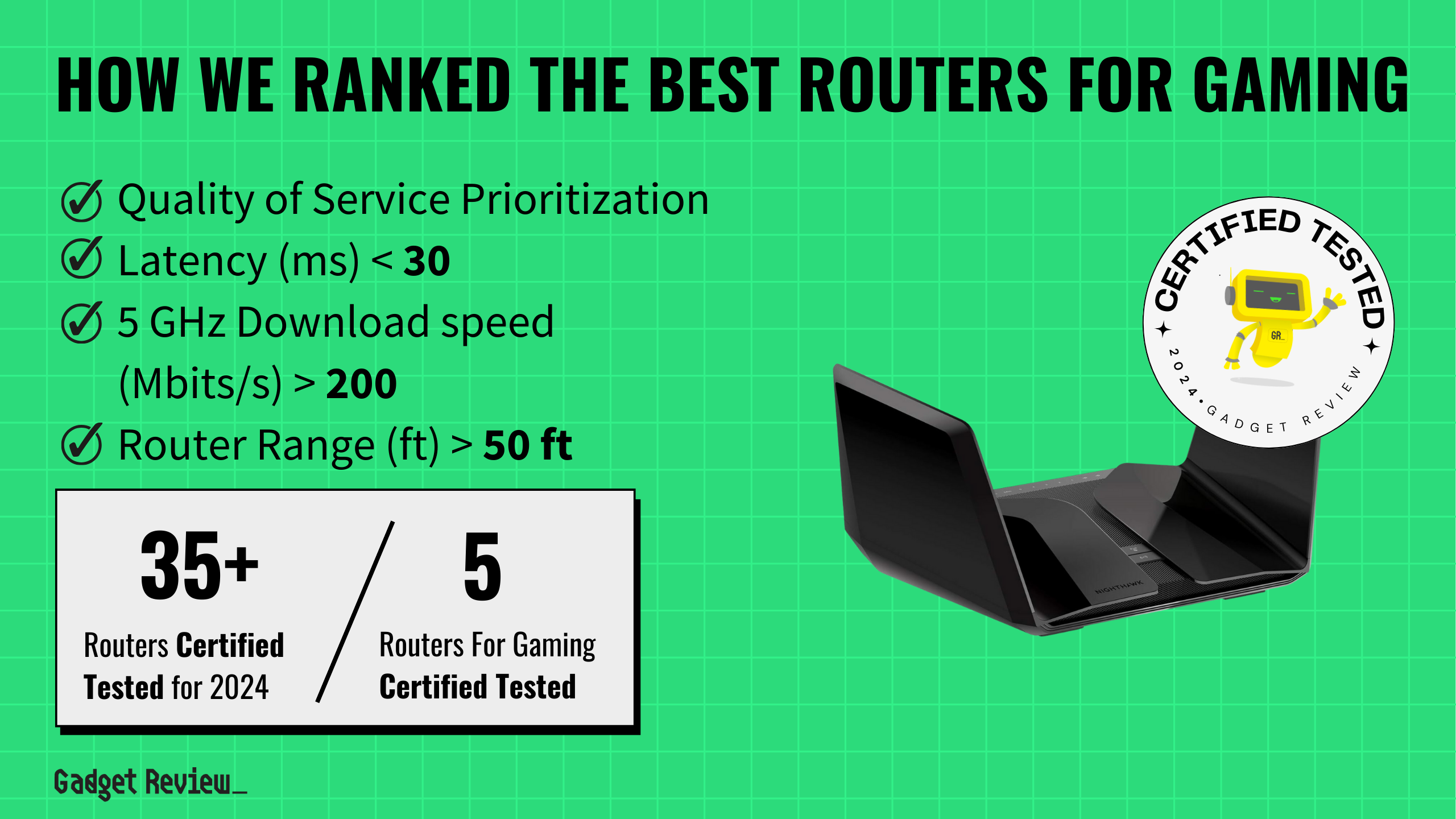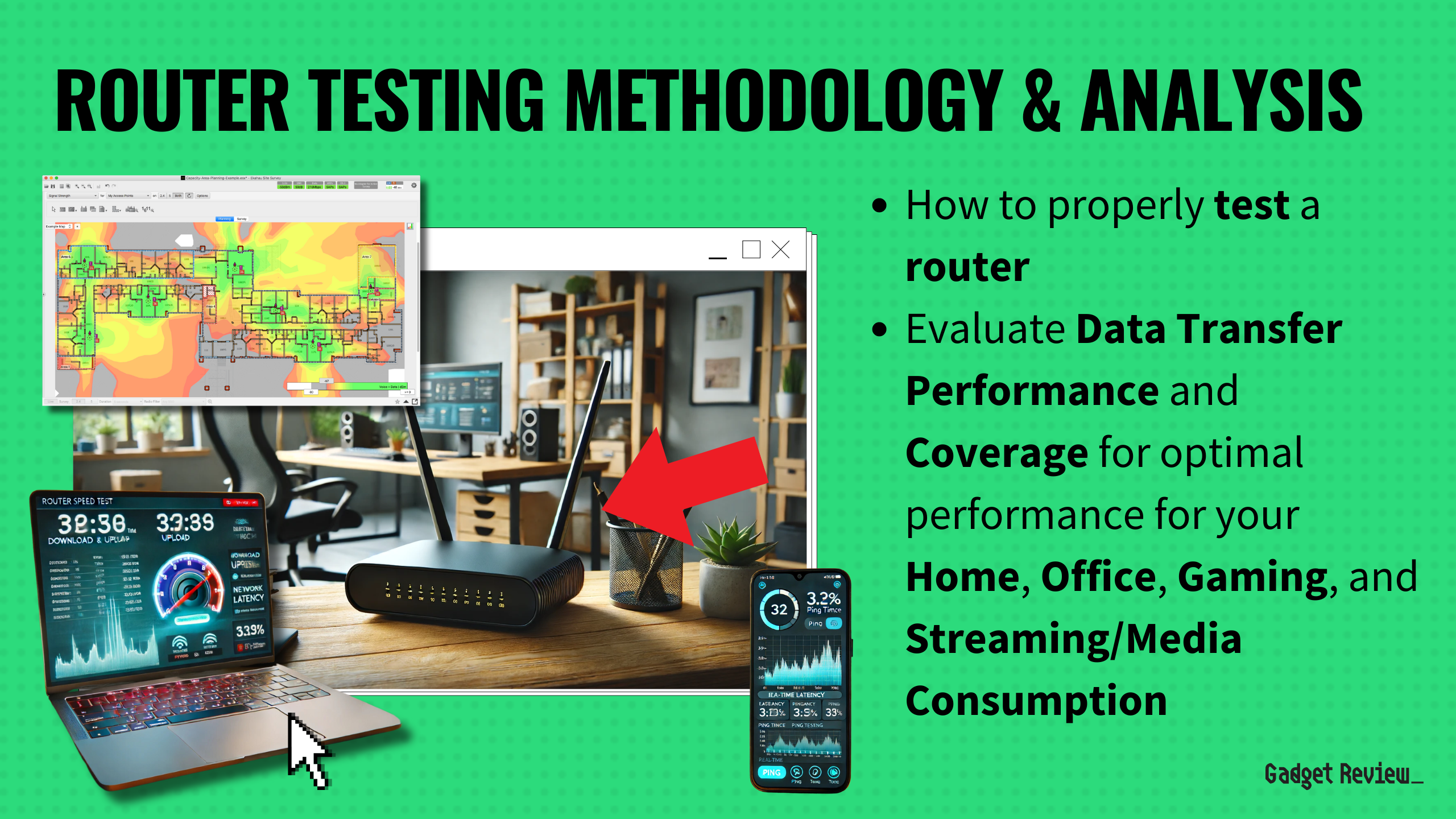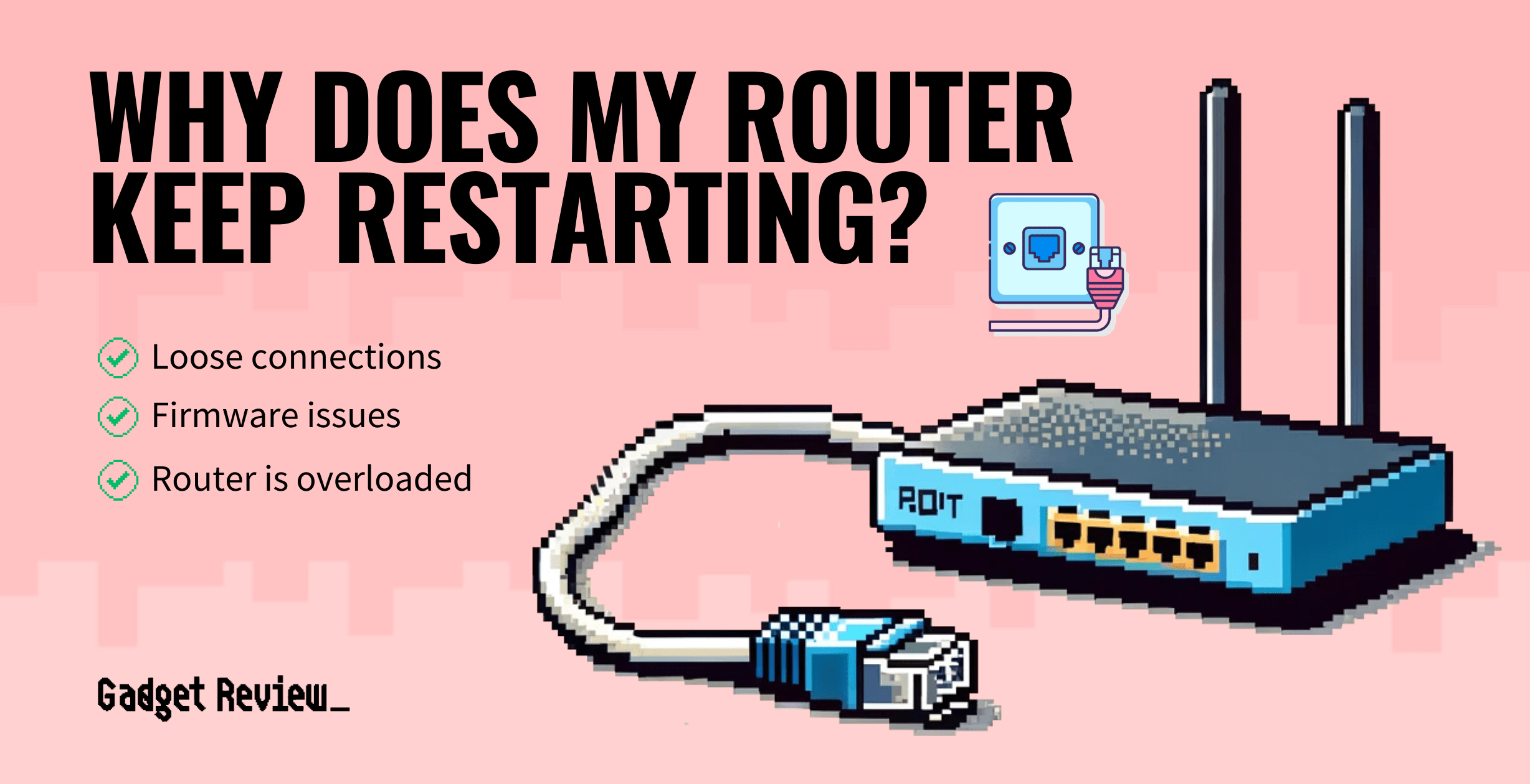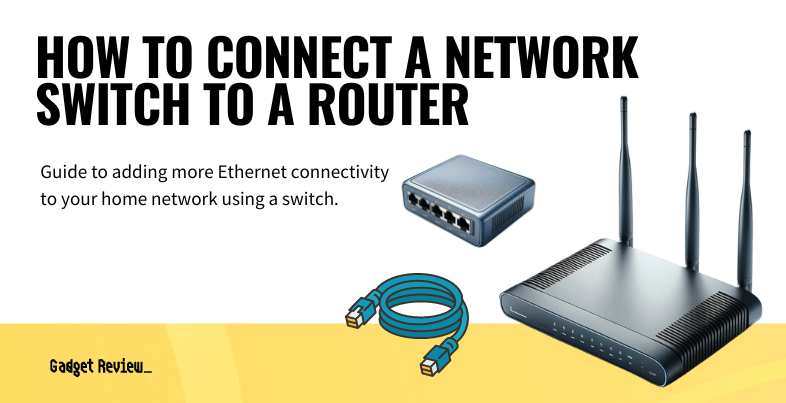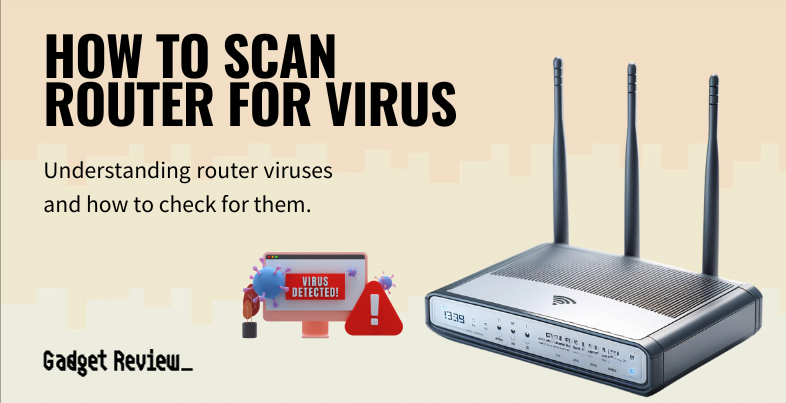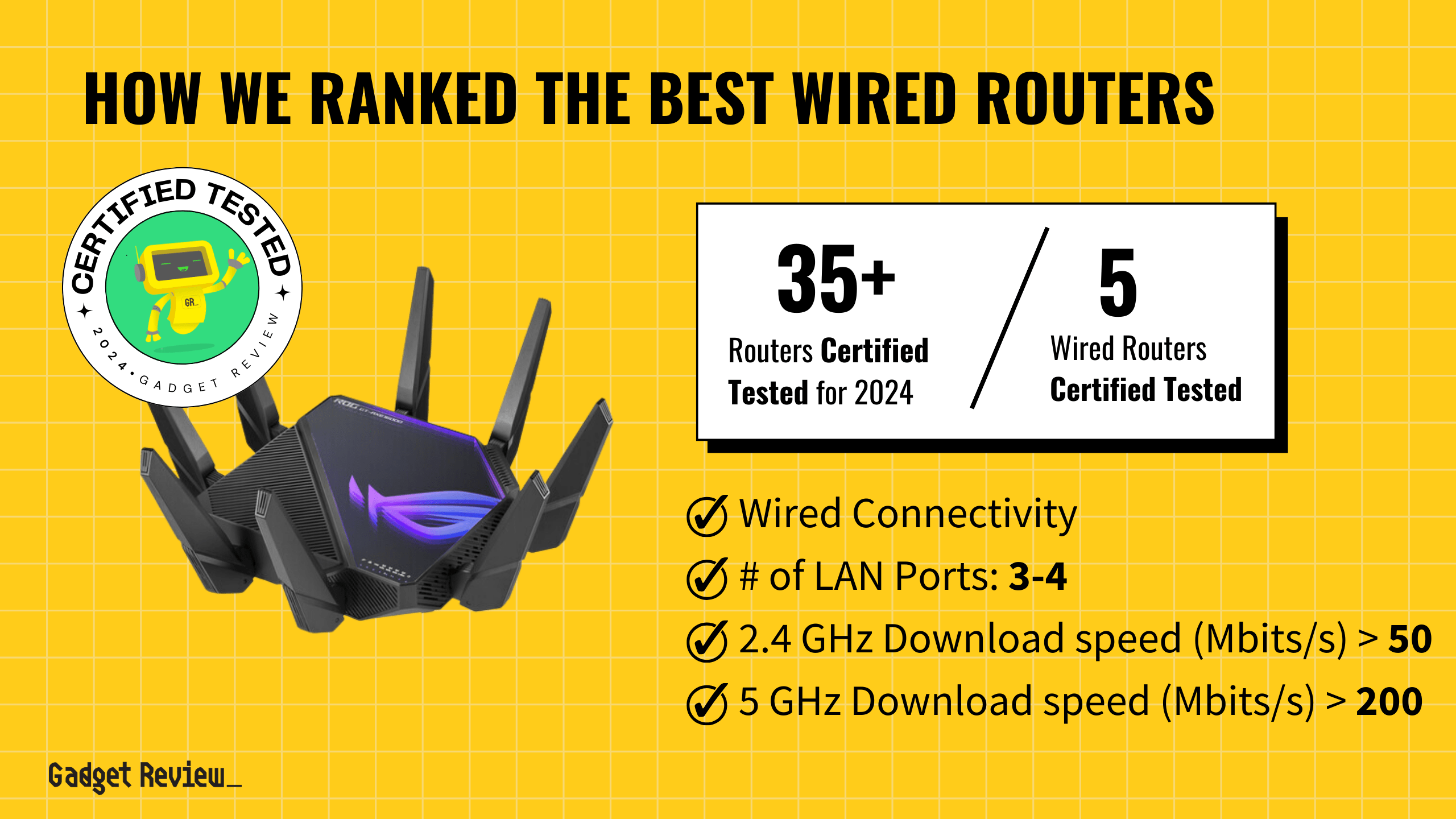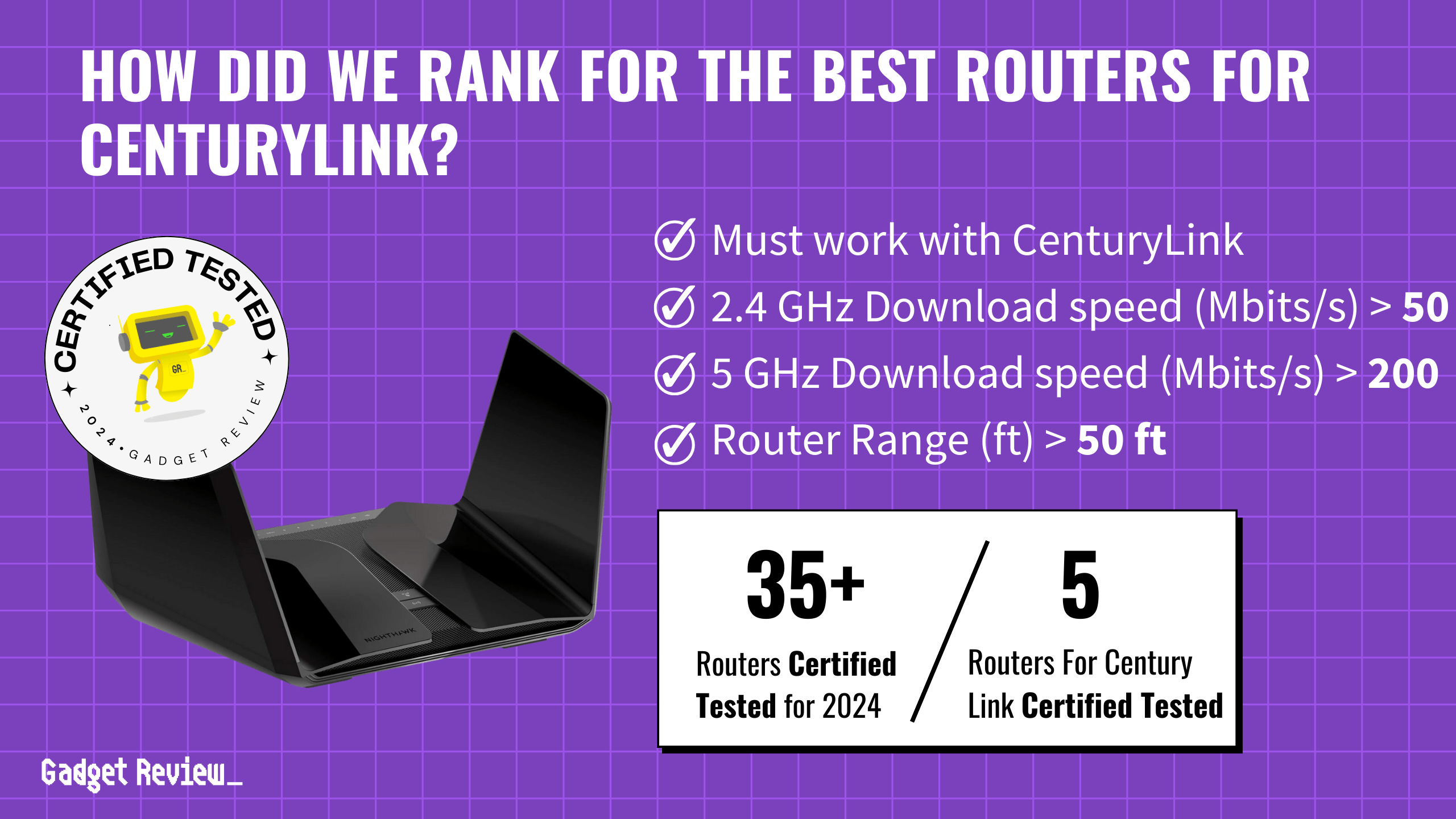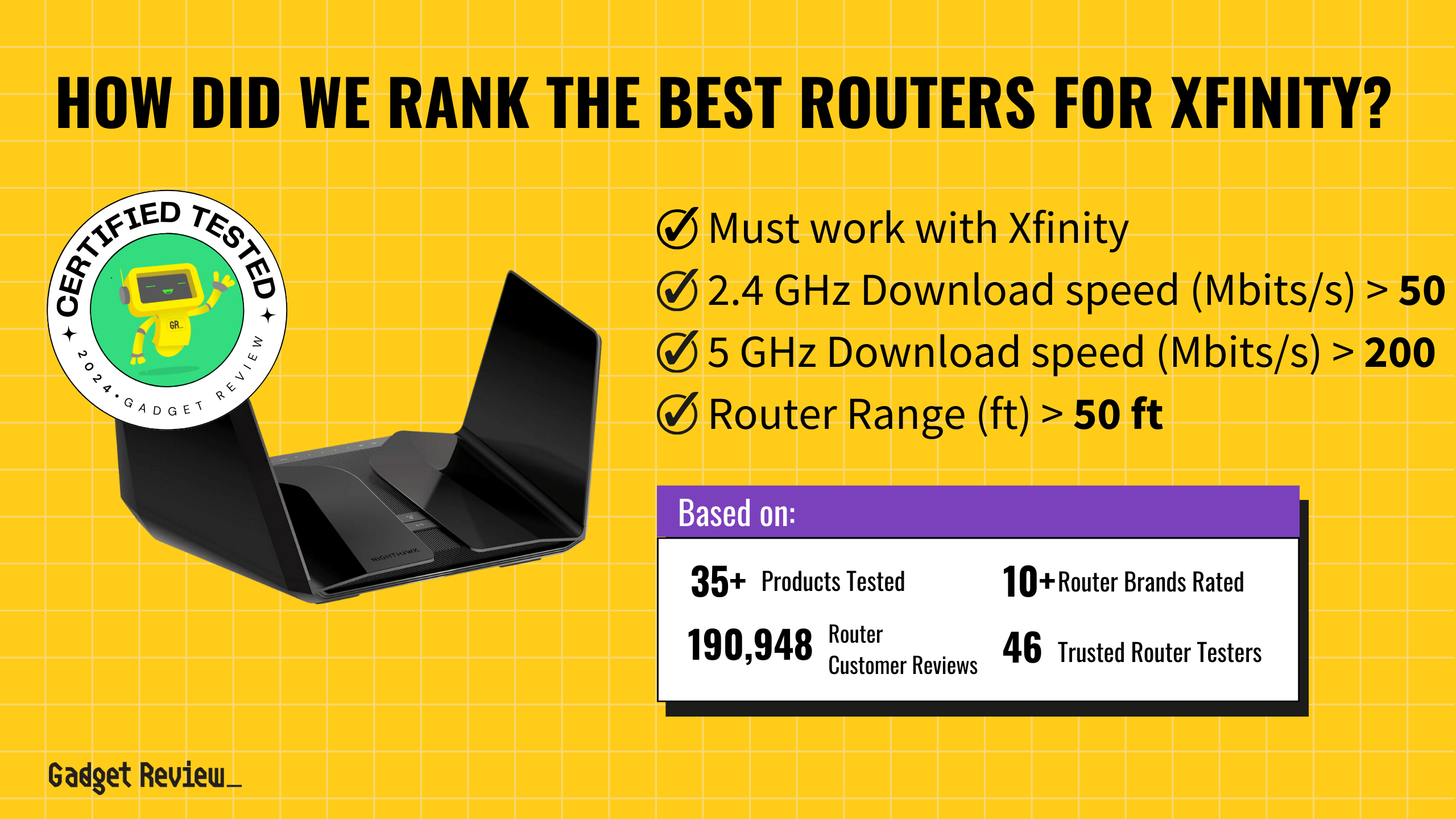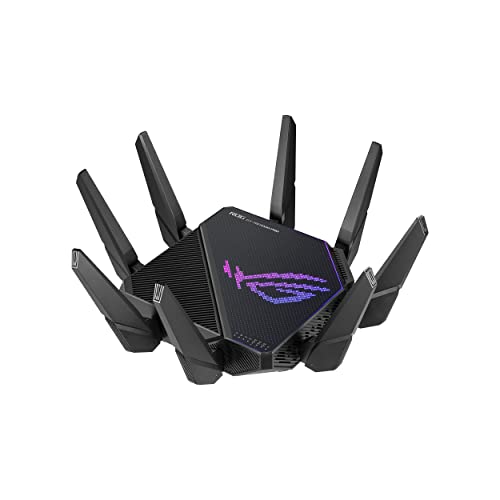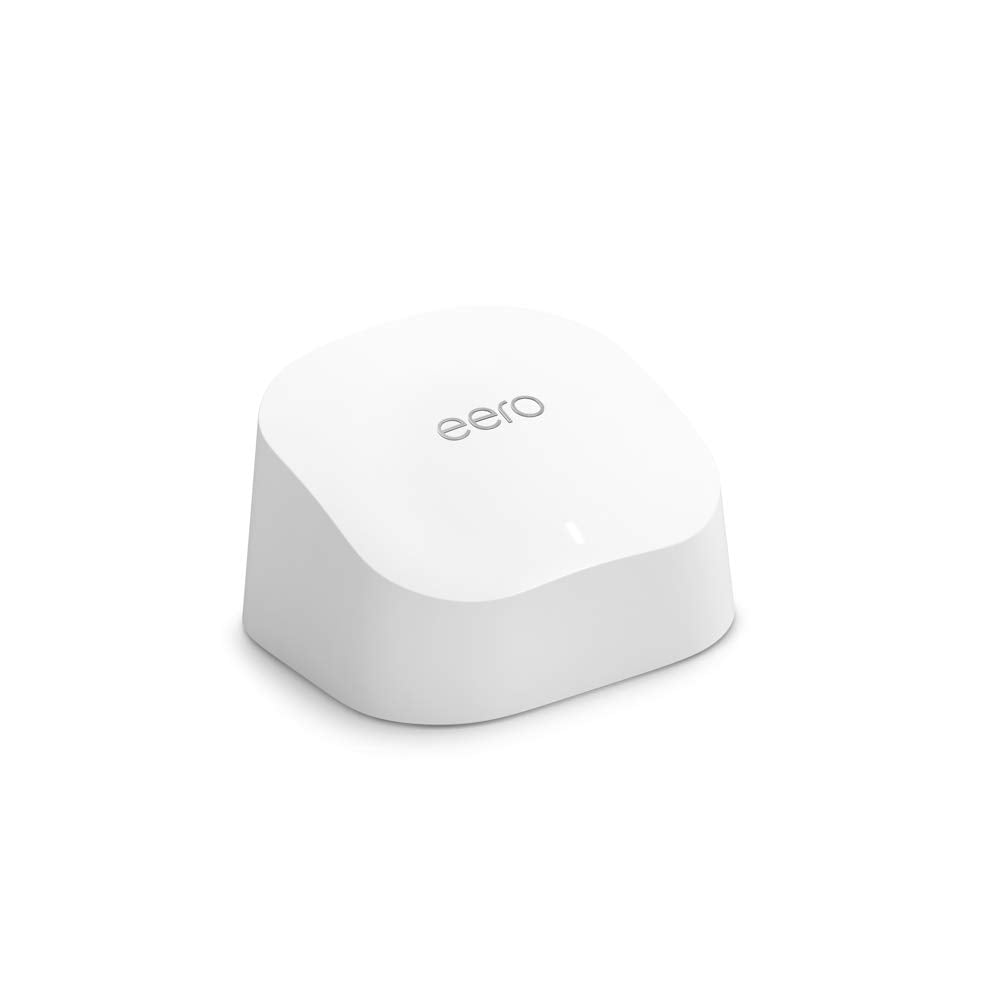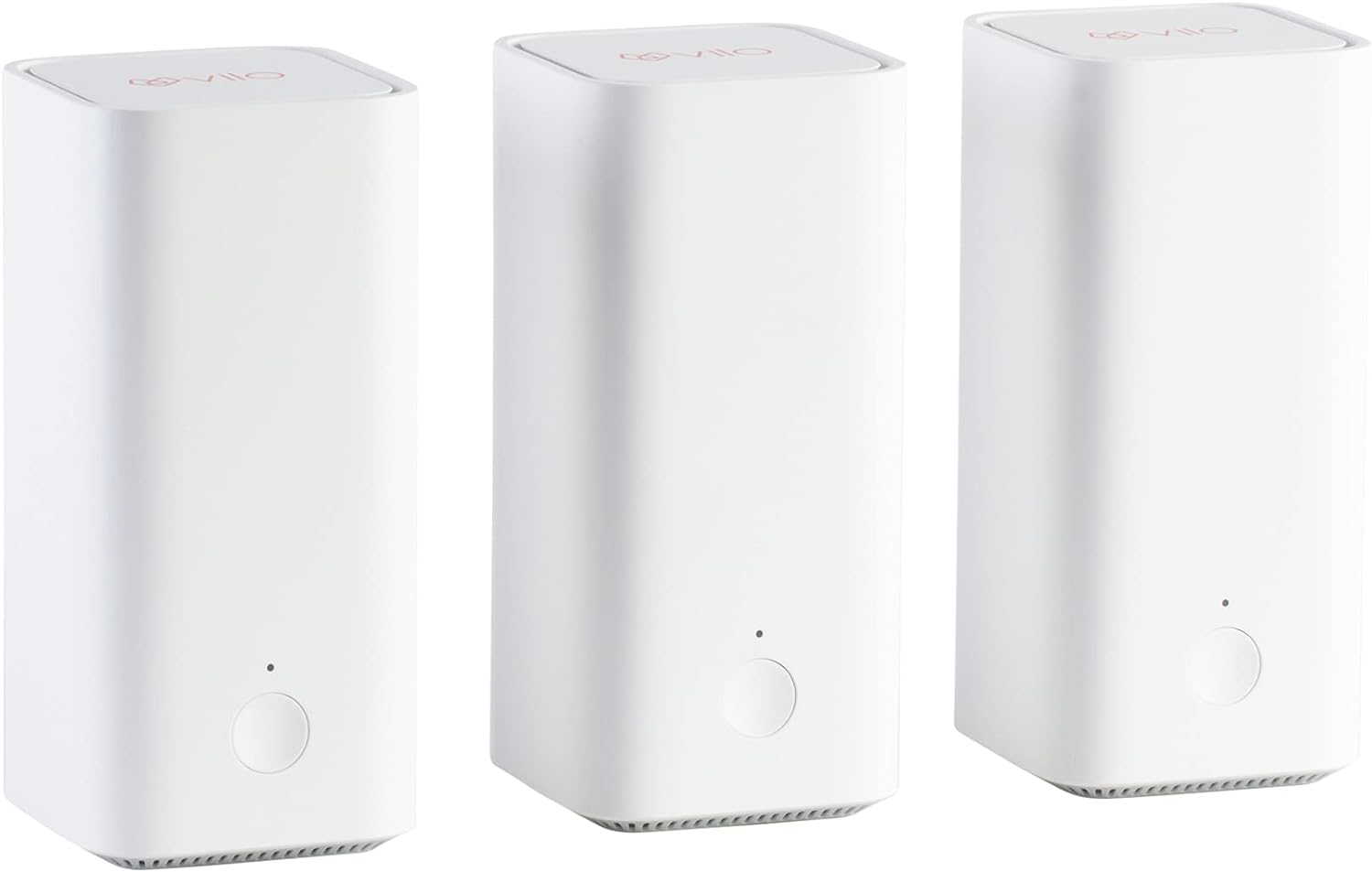When you’re gaming, a fast, reliable internet connection is a must. Slow speeds and lag will ruin the game for you and everyone else. The right router can save the day, giving you a smooth, lag-free gaming experience. We analyzed 37 routers and found 5 that excelled in gaming performance. Our rigorous process involved evaluating 194,551 reviews, filtering out unreliable sources, and certifying the best as tested.
Our True Score system ensures only the top-performing routers make our list. The winning models stood out for their low latency and robust features tailored to gaming needs.
How Did We Rank the Best Routers for Gaming?
To find the best routers for gaming, we delved into over 200 sites, evaluating their testing methodologies, customer feedback, and expert reviews. We then applied our true score to distill this information into actionable insights. Our guide highlights 2 necessary test results, 2 additional desirable tests, and 1 essential specification. This comprehensive approach ensures that you get a router tailored to your gaming needs, offering top-notch performance and reliability.
Our commitment to unbiased reviews is powered by our ‘True Score’ system, targeting low quality and fake reviews. When you shop through our links, you’re backing our mission. Dive deeper to see how.
?️ Minimum Specifications
- Must have a quality of service prioritization.
? Test Criteria
- Latency: A latency of 30 ms or less.
- 5 GHz Download Speed: A download speed on the 5 GHz band of at least 200 Mbits.
? “Nice To Haves”
- Router Range: A range of at least 50 feet before the signal from the router begins to become noticeably weaker.
- 2.4 GHz Download Speed: A download speed on the 2.4 GHz band of at least 50 Mbits.
Latest Updates
- 06/16/2024: Republished the list to include the best routers for gaming based on our True Score system.
Top Routers for Gaming For 2025
Prices accurate at the time of publishing

Best Overall

Runner Up

Best Value

Best Budget

Best Mid-Range

Premium Pick
TP-Link Archer GX-90
The TP-Link Archer GX-90 is a versatile gaming router, offering impressive speeds and advanced features for smooth gameplay and more.
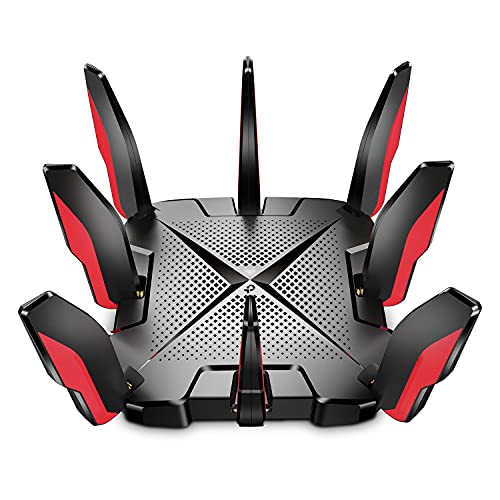
True Score
85847Experts
918kCustomers
Absolutely Fresh
 SAVE $77$249.99$173.30
SAVE $77$249.99$173.30Read More
Snapshot
Reasons to Buy
- Ease of use
Reasons to Avoid
- Below average Wi-Fi speeds
- Middling Wi-Fi range
Specifications

# of LAN Ports 3 
Frequency Bands 2.4 GHz, 5.0 GHz, 6.0 GHz 
MU-MIMO Support Yes 
Wireless Standard AC, AX, N 
Mesh System Yes 
Quality of Service Prioritization Yes 
# of Phone Ports n/a 
# of WAN Ports 2 
App Compatible Yes 
Available Storage n/a 
Band Technology Tri 
Battery Charge Time – 
Data Encryption Type WPA3 
Energy Star Certified n/a 
Integrated Modem No 
LAN Ports – 
Number of Antennas 8 
Parental Controls Available 
Processor Cores Triple 
Processor Speed 1.7GHz 
WiFi Range 2500 sq.ft 
WiFi Speed 6.6 Gb 
Wired Speed Unknown All Specs
Test Results
2.4 GHz Download speed (Mbits/s) 75 5 GHz Download speed (Mbits/s) 280 6 Ghz Download speed (Mbits/s) 0 Latency (ms) 20 Router Range (ft) 40 2.4 GHz Upload speed (Mbits/s) 44 5 GHz Upload speed (Mbits/s) 163 6 Ghz Upload speed (Mbits/s) 0 All Tests
All Retailers
- $173.30$250Save $77
- $229.99
- $298.00
Our Verdict
If you’re seeking a gaming router for a smaller home, the TP-Link Archer GX-90 is a solid mid-range choice. It has good 2.4 and 5 GHz download speeds, at 75.39 Mbits/s and 279.6 Mbits/s, respectively. These speeds ensure smooth and lag-free gaming experiences where every millisecond is crucial. The router’s ability to maintain high-speed connections significantly minimizes in-game latency, providing gamers the competitive edge they need.
Equally important for gaming routers is quality of service (QoS) prioritization, which the Archer GX-90 adeptly manages. This feature prioritizes gaming traffic over other types of internet traffic, ensuring that games receive the bandwidth they need even during heavy network usage. Additionally, the router supports MU-MIMO technology, connecting multiple devices with minimal interference, a bonus for households with multiple gamers or devices.
Although the Archer GX-90 has a limited range of 40 feet, which is fine for smaller areas, the Asus ROG GT6 Mesh offers broader coverage at more than double the range and has mesh capabilities to help eliminate dead zones in larger homes. The GX-90 excels in gaming, but its capabilities extend beyond that. The router’s performance in the 5 GHz band and its latency of 20 ms ensures smooth video playback and responsive web browsing for various other use cases.
The TP-Link Archer GX-90 excels as a versatile gaming router. Its high-speed performance and advanced features, such as QoS prioritization and MU-MIMO support, make it a versatile choice for a wide range of applications, from gaming to watching high-definition videos and beyond, catering to the needs of a modern, connected home.
Read Less

Best Overall

Runner Up

Best Value

Best Budget

Best Mid-Range

Premium Pick
Netgear Nighthawk RAXE500
For premium gaming and beyond, the Netgear Nighthawk RAXE500 router excels with unmatched speed and coverage, ensuring seamless performance for all users.
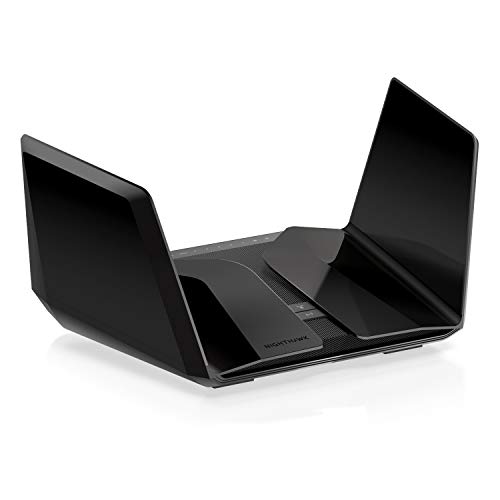
True Score
84847Experts
904kCustomers
Absolutely Fresh
 SAVE $329$599.99$270.99
SAVE $329$599.99$270.99Read More
Snapshot
Reasons to Buy
- Incredibly fast Wi-Fi speeds
- Reliable range
- Simple setup
Reasons to Avoid
- Limited 6GHz range
- Subscription-based parental controls
Specifications

# of LAN Ports 4 
Frequency Bands 2.4 GHz, 5.0 GHz, 6.0 GHz 
MU-MIMO Support Yes 
Wireless Standard AC, AX, N 
Mesh System No 
Quality of Service Prioritization Yes 
# of Phone Ports n/a 
# of WAN Ports 1 
App Compatible Yes 
Available Storage 512MB 
Band Technology Tri 
Data Encryption Type WPA3 
Energy Star Certified No 
Integrated Modem No 
LAN Ports 4 Gb Ethernet 
Number of Antennas 8 
Parental Controls n/a 
Processor Cores Quad 
Processor Speed 1.8GHz 
WiFi Range 3500 sq.ft 
WiFi Speed 10.8 Gb 
Wired Speed 1000 Mb All Specs
Test Results
2.4 GHz Download speed (Mbits/s) 417 5 GHz Download speed (Mbits/s) 844 6 Ghz Download speed (Mbits/s) 1,004 Latency (ms) 19 Router Range (ft) 105 2.4 GHz Upload speed (Mbits/s) 144 5 GHz Upload speed (Mbits/s) 317 6 Ghz Upload speed (Mbits/s) 557 All Tests
All Retailers
- $270.99$600Save $329
- $299.97$600Save $300
- $380.00$600Save $220
- $599.99
Our Verdict
If you’re looking for a premium router, especially as a gaming enthusiast, the Netgear Nighthawk RAXE500 is an excellent choice for its exceptional speed performance. Notably, this router excels with a 6 GHz download speed of 1004.1 Mbits/s and a 6 GHZ upload speed of 557.1 Mbits/s, surpassing competitors and ensuring minimal latency in high-stakes gaming scenarios. This feature is pivotal for gamers where every millisecond counts, providing a seamless and lag-free online gaming experience.
The Nighthawk RAXE500’s capabilities extend beyond gaming. It offers comprehensive coverage with its 844.4 Mbits/s 5 GHz download speed, 316.7 Mbits/s upload speed, and 105-foot range. Its 2.4 GHz speeds of 416.64 Mbits/s download and 143.8 Mbits/s upload ensure even older devices maintain fast connections. This performance outclasses competitors like the TP-Link Archer GX-90, delivering unmatched speed and coverage across all bands. Ideal for gaming, streaming, and downloading, it meets various digital demands, providing a smooth experience for all users.
Equipped with cutting-edge features like Quality of Service prioritization and MU-MIMO support, the Nighthawk RAXE500 is tailor-made for the tech-savvy user. Its ability to prioritize gaming traffic and robust encryption standards ensure performance and security. Its low latency of 19ms further enhances the user experience by ensuring that data packets are promptly processed, minimizing delay in high-demand situations.
The Netgear Nighthawk RAXE500 is more than just a gaming router. Its superior performance in critical areas and features catering to a wide range of digital activities make it a versatile choice for users looking for reliability, speed, and extensive coverage in their digital experiences.
Read Less

Best Overall

Runner Up

Best Value

Best Budget

Best Mid-Range

Premium Pick
Asus RT-AX86S
Best For Secure
This budget-friendly gaming router offers impressive speed and range, ideal for smooth gaming experiences and reliable connections.
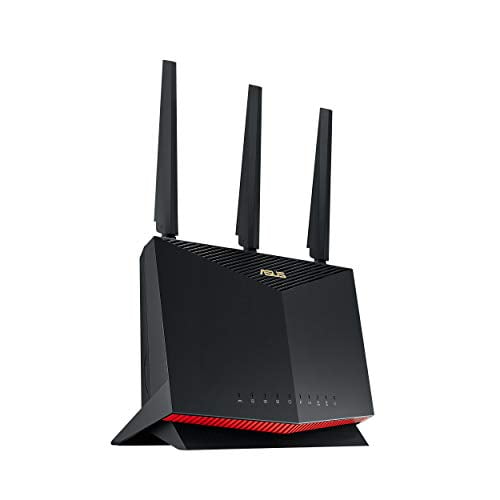
True Score
83833Experts
891kCustomers
Absolutely Fresh
 SAVE $150$249.99$99.99
SAVE $150$249.99$99.99Read More
Snapshot
Reasons to Buy
- Fast WiFi and download speeds
- Incredible range of coverage
- Easy installation and set up
- Low Latency
Reasons to Avoid
- Lacks Backhaul and Mesh Networking
Specifications

# of LAN Ports 4 
Frequency Bands 2.4 GHz, 5.0 GHz 
MU-MIMO Support Yes 
Wireless Standard AC, AX, N 
Mesh System No 
Quality of Service Prioritization Yes 
# of Phone Ports n/a 
# of WAN Ports 1 
App Compatible Yes 
Available Storage 256MB 
Band Technology Dual 
Data Encryption Type WPA, WPA-Enterprise, WPA2, WPA2-Enterprise, WPA3, WPA3-Enterprise, WPS 
Energy Star Certified No 
Integrated Modem No 
LAN Ports 4 Gb Ethernet 
Number of Antennas 4 
Parental Controls Yes 
Processor Cores Dual 
Processor Speed 1.8GHz 
WiFi Range 5400 sq. ft 
WiFi Speed 5.7 Gb 
Wired Speed – All Specs
Test Results
2.4 GHz Download speed (Mbits/s) 89 5 GHz Download speed (Mbits/s) 563 6 Ghz Download speed (Mbits/s) 0 Latency (ms) 15 Router Range (ft) 140 2.4 GHz Upload speed (Mbits/s) 0 5 GHz Upload speed (Mbits/s) 23 6 Ghz Upload speed (Mbits/s) 0 All Tests
All Retailers
- $99.99$250Save $150
- $202.24$225Save $23
Our Verdict
If you’re searching for a budget-friendly gaming router, the Asus RT-AX86S stands out, particularly for its blend of performance and value. With an impressive 5 GHz download speed of 563 Mbits/s, this router ensures smooth, lag-free gaming sessions, a critical factor for gamers where every millisecond counts. Though not the highest, its 2.4 GHz download speed of 89 Mbits/s provides a reliable connection for less intensive tasks and devices further from the router.
The Asus RT-AX86S is not just about speed; it also excels in range, with a capability of covering up to 140 feet. This extensive coverage is essential for gamers and streamers, ensuring a stable connection even when far from the router. Its inclusion of advanced features like quality of service prioritization, MU-MIMO support, and app compatibility further enhance its usability, allowing for a tailored and efficient networking experience.
However, it’s important to note that the Asus RT-AX86S might not be the best fit for every scenario. For instance, when considering routers like the Netgear Nighthawk RAXE500, which offers superior 6 GHz speeds and a broader range, some users with extensive gaming setups or larger homes might find it a better fit.
Nonetheless, the Asus RT-AX86S is a robust option for gamers, ensuring high performance where it matters most. Its balance of speed, range, and advanced features makes it a valuable contender for those looking to optimize their gaming experience without compromising reliability and coverage.
Read Less

Best Overall

Runner Up

Best Value

Best Budget

Best Mid-Range

Premium Pick
Asus ROG GT6 Mesh
Best For Vpn
The Asus ROG GT6 Mesh offers exceptional connectivity for gaming and streaming, with impressive upload speeds and extensive range, catering to active households.

True Score
80826Experts
854kCustomers
Absolutely Fresh
 SAVE $80$479.99$399.99
SAVE $80$479.99$399.99Read More
Snapshot
Reasons to Buy
- Fast Download/Upload Speed
- Easy to install and operate
Reasons to Avoid
- WiFi speed drops off at long range
- Connection range is limited
- Limited USB Connectivity
- Mediocre Latency
Specifications

# of LAN Ports 3 
Frequency Bands 2.4 GHz, 5.0 GHz 
MU-MIMO Support Yes 
Wireless Standard AC, AX, N 
Mesh System Yes 
Quality of Service Prioritization Yes 
# of Phone Ports n/a 
# of WAN Ports 1 
App Compatible Yes 
Available Storage 256MB 
Band Technology Tri 
Data Encryption Type WEP, WPA-Enterprise, WPA-PSK, WPA2-Enterprise, WPA3-Personal 
Energy Star Certified No 
Integrated Modem No 
LAN Ports 3 Gb Ethernet 
Number of Antennas 9 
Parental Controls Yes 
Processor Cores Triple 
Processor Speed 1.7GHz 
WiFi Range 5800 sq. ft 
WiFi Speed 2.6 Gb 
Wired Speed 2500 Mb All Specs
Test Results
2.4 GHz Download speed (Mbits/s) 139 5 GHz Download speed (Mbits/s) 701 6 Ghz Download speed (Mbits/s) 0 Latency (ms) 22 Router Range (ft) 95 2.4 GHz Upload speed (Mbits/s) 112 5 GHz Upload speed (Mbits/s) 619 6 Ghz Upload speed (Mbits/s) 0 All Tests
All Retailers
- $399.99$480Save $80
- $399.99$480Save $80
Our Verdict
If you have a large home or numerous devices connected simultaneously, the Asus ROG GT6 Mesh is an ideal router for gamers, providing extensive and seamless coverage across large areas to ensure gamers can connect from any corner of the home without losing signal strength. Its standout feature, a remarkable 5 GHz download and upload speed of 701.3 and 618.5 Mbits/s, respectively, ensures fluid, superior-quality video calls and online gaming experiences, making it an optimal choice for active homes.
In addition, the router’s 2.4 GHz download speed of 139.35 Mbits/s is tailored to support everyday internet activities, ensuring a reliable connection for browsing and downloading. This aspect is especially vital for gamers and streamers who require uninterrupted, smooth online engagement and crystal-clear live streaming. Moreover, with a latency of 22 ms, this router manages rapid-paced online gaming sessions with negligible lag, catering well to the needs of gamers and streamers.
Beyond gaming, the Asus ROG GT6 Mesh exhibits versatility across various scenarios, including streaming and long-range connectivity. Its mesh system support ensures expansive coverage, eliminating dead zones and maintaining stable connections throughout larger homes. Coupled with the quality of service prioritization, ensures that high-demand applications receive the bandwidth they need for uninterrupted performance. Furthermore, data encryption and MU-MIMO support are integral for securing network traffic and enhancing device handling capacity, underlining the router’s comprehensive capabilities.
Considering the breadth of its performance, the Asus ROG GT6 Mesh is not only suited for gaming but also excels in streaming, with its superior upload speeds ensuring high-quality content delivery. Its extensive range and advanced features, like app compatibility, make it a reliable choice for larger homes and varied use cases. It embodies a blend of high-end performance and versatility that appeals to many users.
Read Less

Best Overall

Runner Up

Best Value

Best Budget

Best Mid-Range

Premium Pick
TP-Link Archer AXE75
Best For Parental Controls
For budget-conscious gamers, the TP-Link Archer AXE75 excels with fast 5 GHz speeds, 6 GHz support, and low latency, ideal for competitive gaming.
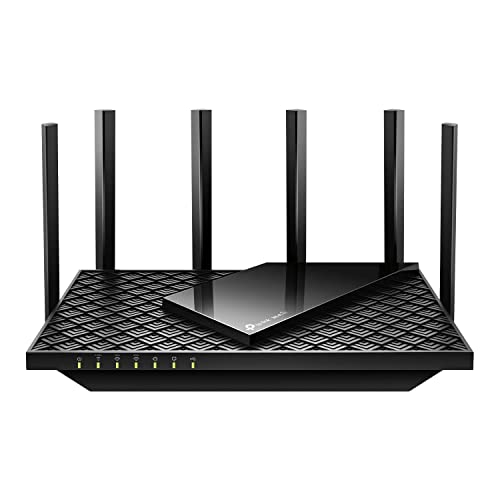
True Score
79794Experts
862kCustomers
Mixed Reviews
 SAVE $53$199.99$147.35
SAVE $53$199.99$147.35Read More
Snapshot
Reasons to Buy
- Good WiFi speeds
- Adequate range
- Simple set up
Reasons to Avoid
- Average download speeds
- Limited coverage
- Subscription-based security solutions
Specifications

# of LAN Ports 4 
Frequency Bands 2.4 GHz, 5.0 GHz, 6.0 GHz 
MU-MIMO Support Yes 
Wireless Standard AC, AX 
Mesh System Yes 
Quality of Service Prioritization Yes 
# of Phone Ports n/a 
# of WAN Ports 1 
App Compatible Yes 
Available Storage n/a 
Band Technology Tri 
Data Encryption Type WPA3 
Energy Star Certified n/a 
Integrated Modem No 
LAN Ports Gigabit Ethernet 
Number of Antennas 6 
Parental Controls Yes 
Processor Cores Triple 
Processor Speed 1.7GHz 
WiFi Range 2500 sq.ft 
WiFi Speed 2.4GHz 
Wired Speed 1000 Mb All Specs
Test Results
2.4 GHz Download speed (Mbits/s) 65 5 GHz Download speed (Mbits/s) 309 6 Ghz Download speed (Mbits/s) 318 Latency (ms) 9 Router Range (ft) 60 2.4 GHz Upload speed (Mbits/s) 0 5 GHz Upload speed (Mbits/s) 0 6 Ghz Upload speed (Mbits/s) 0 All Tests
All Retailers
- $147.35$200Save $53
- $149.00$159Save $10
- $149.99$180Save $30
Our Verdict
If you’re looking for a budget-oriented tri-band router, the TP-Link Archer AXE75 is a compelling option. Boasting a 5 GHz download speed of 309.1 Mbits/s, this router ensures that high-speed internet is no longer a bottleneck during intense gaming sessions. Equipped with Wifi 6E, the TP-Link Archer AXE75 also taps into the less congested 6 GHz band, enhancing its capacity for high-speed downloads at 317.9 Mbits/s. The 60-foot range, although modest, is sufficient for most gaming setups, ensuring coverage without sacrificing speed or reliability. Moreover, the router’s standout feature, a mere 9 ms latency, provides the near-instantaneous response necessary for competitive gaming, where every moment counts.
For better 6 GHz performance, the Netgear Nighthawk RAXE500 offers much faster speeds at 1004.1 Mbits/s, but at a premium price. The TP-Link Archer AXE75 makes up for the lack of 6 GHz speed with support for critical specifications such as MU-MIMO, ensuring multiple devices can simultaneously enjoy high-bandwidth gaming without interference. Furthermore, the quality of service prioritization fine-tunes the network traffic, giving gaming packets the fast lane over other data types. This approach to data handling is crucial for maintaining uninterrupted gaming sessions, especially in environments with diverse internet usage.
The TP-Link Archer AXE75’s impressive performance across various metrics makes it a smart choice for gamers. But its value doesn’t stop there. This router is equally adept at handling bandwidth-intensive tasks like watching high-definition content, making it a versatile addition to any tech-savvy household. With its solid performance and gamer-friendly features, this router is a wise investment for those looking to upgrade their gaming setup or ensure a seamless online experience across multiple devices without breaking the bank.
Read Less
Which Criteria Matters for Testing Best Routers for Gaming?
By focusing on these criteria (2 required, 2 nice to have), anyone can quickly and easily compare these routers and how they’ll perform. This helps you make an informed decision and purchase a router that will meet your needs.
| CRITERIA | RANGE | REQUIRED | DEFINITION |
|---|---|---|---|
| Latency | < 30 ms | Yes | The delay that is created by a signal being sent by the router and then received. |
| 5 GHz Download Speed | > 200 Mbits/s | Yes | The maximum speed that the router can reach when downloading on the 5 GHz band. |
| Router Range | > 50 ft | No (Nice to have) | How far a device can be from a router before the signal starts degrading. It is worth noting that 2.4 GHz reaches further than 5 GHz. |
| 2.4 GHz Download Speed | > 50 Mbits/s | No (Nice to have) | The maximum speed that the router can reach when downloading on the 2.4 GHz band. |
Our Trusted Data Sources
We looked at 120+ router reviewers and found that 46 are trustworthy (60%+ Trust Rating). The three we have listed below are our most trusted for routers.
- James Morris – Kit Guru, LinkedIn
- Matt Spencer – TechGearLab, LinkedIn
- Brian Nadel – Tom’s Guide, MuckRack
Interested in a comprehensive analysis of our data sources? We’ve got you covered. Below, you’ll find a detailed list of every router review website we’ve identified, organized by their respective Trust Ratings from highest to lowest. But we didn’t stop there. We’ve meticulously reviewed each publication and verified the data by checking whether the authors have bio links to MuckRack or LinkedIn. We’re committed to not only checking the facts but ensuring their veracity.
Router Test Data & Results
Disclaimer:
Evaluating router performance is more than hardware analysis. While hardware tests are straightforward, the challenge lies in contextualizing the results within the limits of real-world usage. Routers operate under conditions that testers cannot fully standardize, including variations in Internet Service Providers (ISPs), network traffic congestion, discrepancies between advertised and actual internet speeds, and the physical layout of homes. These factors introduce a degree of unpredictability, making it hard to draw universal conclusions. As such, our router recommendations aim to provide useful general guidance, accommodating a wide range of home environments and internet setups.
1. Latency (ms)
Latency
< 30 ms
Acceptable range of performance
Definition: The time it takes for the router to send and then receive signals.
Units of Measurement: Milliseconds (ms)
Tools to Measure: Speed-checking software
Why It’s Important:
Latency is important to reduce delay when gaming and video conferencing.
On a router, latency refers to how long it takes for the router to send out and receive a signal. The longer it takes, the more delay there is between you sending and receiving data, which can introduce lag in video games and also makes video conferencing harder since the person you’re speaking with now has to contend with your delay and vice versa. If you’ve ever spent a call talking over someone because you don’t know they started talking a second ago, that’s latency.
For that reason, we recommend a latency below 40 ms. As low as you can get it is obviously preferable, but latency is another aspect of your internet connection that is hard to manage. Latency differs to every single place you connect to, and every ISP has its own latency they “add” because you have to connect to their service too. Latency creeps in from your ISP, from the site you’re requesting data from, from your router, and from your own onboard Wi-Fi antenna – and that’s just to name a few sources. If you’re gaming, you also have a delay introduced by your connection to game servers and the delay that exists on a hardware level when you input commands.
Latency (ms; lower is better; 0 = No Data)
2. 5 GHz Download Speed (Mbits/s)
5 GHz Download Speed
> 200 Mbits/s
Acceptable range of performance
Definition: The top speed the router reaches downloading on the 5 GHz band.
Units of Measurement: Mbits/s (megabits per second)
Tools to Measure: Speed-checking software
Why It’s Important:
This band is used by most modern devices and offers greater speeds that enable activities like gaming and HD streaming on multiple devices.
The much faster 5 GHz band offers up much greater bandwidth and is much, much better at meeting high-speed demands. Streaming high-quality video, using streaming services, gaming, downloading large files and games – the 5 GHz band is what makes all of these activities quick and bearable. It reaches a lower range than the 2.4 GHz band, but it’s also much faster, so you’ll use it more, especially on newer devices that actually support the band.
Given how much you’ll be using this band, we recommend a speed of at least 200 Mbits/s to ensure you’re able to enjoy streaming and gaming on at least a few devices simultaneously. Any lower and you start to run into real bottleneck concerns, such as endless buffering, lagging, or drops in connection.
5 GHz Download Speed (Mbits/s; higher is better; 0 = No Data)
3. Router Range (ft)
Router range is exactly what the name suggests: how far can you get from the router before you start experiencing issues with your connection? The complicating factor is the simple fact that range depends on the band you’re using. 2.4 GHz is a band that offers greater range, so it gives tests results that show a greater range than tests that use the 5 GHz band. In general, our research found most publications used the 5 GHz band, so our recommendations are based on that.
As such, we recommend your router have a range of at least 50 ft. This gives you a good “bubble” around the router that you can connect to, but it’s important to know that things like the walls in your home can cause issues. Thicker walls block more signal, thinner walls block less. Some materials will also do a better job than others will at stopping signal, so if you see a router with a range of 65 ft, know that it might not reach that far in your home. It could reach further – or not nearly as far. This is also why you get dead zones in your home – it’s a matter of geometry and materials.
Router Range
> 50 ft
Acceptable range of performance
Definition: The distance the router transmits reliable signal out to before performance and speed degrades.
Units of Measurement: Feet (ft)
Tools to Measure: Measuring Tape
Why It’s Important:
Range impacts how far you’ll get a reliable connection in your home, and whether you’ll need extenders or not.
Router Range (ft; higher is better; 0 = No Data)
4. 2.4 GHz Download Speed (Mbits/s)
The oldest and slowest of the bands on a router is the 2.4 GHz band, but it sticks around for a reason. Generally speaking, while this band features the slowest available speeds and has the lowest bandwidth, but also reaches out the furthest. It’s not the best band to connect to connect if you need high speeds, but if you just need to be connected for light browsing or anything that’s low bandwidth, it works. Alternatively, if you own a lot of old devices, this band may be the only band they can “see” and therefore, use.
Given the age of the band, top speeds on 2.4 GHz cap out very quickly. We recommend a speed of at least 50 Mbits/s, but if you aren’t really going to be using this band for anything other than checking web pages, you can go lower. It’s worth noting, though, that this might lead to a more frustrating and laggier time on modern sites with lots of scripting and high-quality images.
2.4 GHz Download Speed
> 50 Mbits/s
Acceptable range of performance
Definition: The top speed the router reaches downloading on the 2.4 GHz band.
Units of Measurement: Mbits/s (megabits per second)
Tools to Measure: Speed-checking software
Why It’s Important:
For older devices or for connecting at a longer range, the 2.4 GHz frequency is the only one that you’ll be able to use, so it should have usable speed.
2.4 GHz Download Speed (Mbits/s; higher is better; 0 = No Data)
Best Routers for Gaming: Mistakes To Avoid
- Ignoring Latency: Latency, or ping, is the time it takes for data to travel from your device to the game server and back. High latency can lead to lag and disrupt your gaming experience. Look for routers with low latency features and prioritize gaming traffic to minimize delays.
- Neglecting Bandwidth Needs: Gaming requires a reliable and stable internet connection, especially for online multiplayer games. Make sure to choose a router with sufficient bandwidth to handle gaming traffic, as well as other internet activities happening simultaneously in your household.
- Focusing Solely on Speed: While fast internet speeds are important for gaming, they are not the only factor to consider. Look for routers with features like Quality of Service (QoS) that prioritize gaming traffic, as well as low latency and reliable connections.
- Disregarding Wired Connections: While Wi-Fi is convenient, a wired Ethernet connection typically provides lower latency and more stable performance, which is important for gaming. Choose a router with multiple Ethernet ports to connect your gaming devices directly whenever possible.
The Best Routers for Gaming Tests Compared
Product |
True Score
|
2.4 GHz D/L Speed
|
5 Ghz D/L Speed
|
6 GHz D/L Speed
|
Range
|
Latency
| |
|---|---|---|---|---|---|---|---|
| 85 |
|
|
|
|
| $173.30 $250 $77 |
| 84 |
|
|
|
|
| $270.99 $600 $329 |
| 83 |
|
|
|
|
| $99.99 $250 $150 |
| 80 |
|
|
|
|
| $399.99 $480 $80 |
| 79 |
|
|
|
|
| $147.35 $200 $53 |

